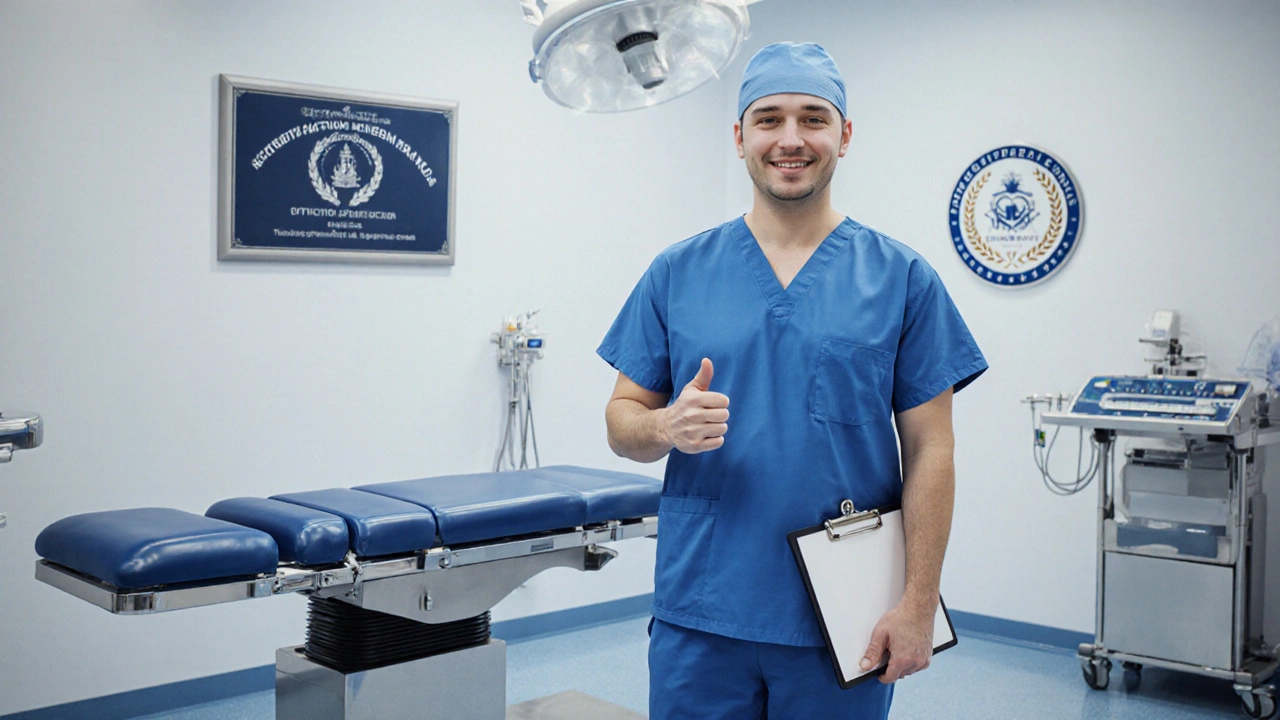When it’s time for a minor procedure-think mole removal, cataract extraction, or a small orthopedic fix-you’ll want a clinic that feels safe, competent, and hassle‑free. Picking the right Minor Surgery Clinic can feel like a maze, especially when every location touts state‑of‑the‑art tech and friendly staff. This guide walks you through the exact questions to ask, the red flags to watch, and the quick‑check tools that turn uncertainty into confidence.
Quick Takeaways
- Verify the clinic’s licensing and accreditation from bodies like Health Canada and the Joint Commission.
- Check that the surgeon’s credentials match the specific procedure you need.
- Ask about infection‑control protocols, sterilization methods, and on‑site emergency equipment.
- Confirm that your insurance is accepted and that cost estimates are transparent.
- Read recent patient reviews and, if possible, schedule a pre‑procedure visit.
What Exactly Is a Minor Surgery Clinic?
Minor Surgery Clinic is a healthcare facility that specializes in outpatient procedures requiring only local anesthesia or light sedation. These clinics handle surgeries that typically last under two hours, allow patients to go home the same day, and focus on fast recovery times. Unlike full‑scale hospitals, the setting is designed for efficiency while still meeting strict safety standards set by national health agencies. The goal is to blend hospital‑level hygiene with the convenience of a doctor’s office.
Step 1: Verify Credentials & Accreditation
The first line of defense is paperwork. In Canada, any legitimate clinic must hold a licence from the provincial regulator (for British Columbia, that’s the College of Physicians and Surgeons of British Columbia) and be inspected by an accreditation body like the Joint Commission International (JCI). Look for these badges on the clinic’s website or ask to see a current inspection report.
Why does it matter? Accredited clinics have passed rigorous audits on everything from staff training to emergency response plans. If a clinic can’t produce up‑to‑date certificates, that’s a major red flag.
Step 2: Assess Safety & Hygiene Standards
Even minor procedures carry infection risk. Ask the clinic to describe its Infection Control Protocol. Key points include:
- Use of autoclaves for instrument sterilization, with temperature logs kept for each cycle.
- Implementation of a surgical‑site‑verification checklist similar to the WHO’s “Safe Surgery Saves Lives” protocol.
- Availability of on‑site emergency equipment-defibrillator, oxygen, and a stocked crash cart.
- Regular hand‑hygiene audits and staff training on aseptic techniques.
If the clinic can walk you through these steps and even show recent audit scores, you’ll have peace of mind.
Step 3: Look at Surgeon Experience & Specialties
Not all surgeons are created equal. The Surgeon you’ll see should have specific experience with the exact procedure you’re scheduling. Ask for:
- Number of times they’ve performed the same surgery in the past year.
- Board certification in the relevant specialty (e.g., dermatology, orthopedics, ophthalmology).
- Any published research or participation in professional societies.
Many reputable clinics post surgeon bios on their site, but a quick call can verify the details. A surgeon who regularly handles your procedure is more likely to anticipate nuances and avoid complications.

Step 4: Confirm Insurance Coverage & Cost Transparency
Out‑of‑pocket surprises are the worst part of any medical visit. Before you book, get a written estimate that includes:
- Professional fees for the surgeon and any assisting staff.
- Facility fees (the cost of using the clinic’s operating room and equipment).
- Anesthesia or sedation charges, even if only local agents are used.
- Potential post‑procedure medication or follow‑up visit costs.
Cross‑check this estimate with your Insurance Provider to see what will be covered. Some clinics work directly with insurers to handle claims, which simplifies paperwork for you.
Step 5: Read Real Patient Feedback
Word of mouth is priceless, but you can also tap into online platforms. Look for recent reviews on sites like RateMDs or Healthgrades. Pay attention to recurring themes-consistent praise for punctuality and courteous staff is a good sign, while repeated complaints about stale dressings or delayed results should raise concerns.
When possible, ask the clinic if they can connect you with a former patient who had the same procedure. A short, candid conversation often reveals practical tips not listed on marketing materials.
Step 6: Tour the Facility & Ask Direct Questions
A quick visit can reveal details you can’t capture over the phone. During the tour, ask about:
- How many rooms are dedicated to minor surgeries versus general consultations.
- Whether the clinic has a separate recovery area with monitoring equipment.
- What the protocol is for a post‑procedure complication-who is on call after hours?
- How they handle waste disposal and environmental cleaning between cases.
Notice the cleanliness of common areas, the professionalism of front‑desk staff, and whether the environment feels calm rather than chaotic.
Step 7: Make the Final Decision - A Quick Checklist
| Criteria | Yes / No | Notes |
|---|---|---|
| Current provincial licence | ||
| Accredited by JCI or similar body | ||
| Surgeon has performed your procedure ≥10 times in past year | ||
| Clear infection‑control protocol shared | ||
| On‑site emergency equipment available | ||
| Insurance accepted & cost estimate provided | ||
| Positive recent patient reviews (≥4‑star rating) | ||
| Facility tour completed, staff answered questions |
If you can tick most of the boxes, you’ve likely found a clinic that balances safety, expertise, and convenience. Remember, the best choice feels right both on paper and in the gut after the walkthrough.
Common Pitfalls to Avoid
Even with a checklist, some traps sneak in:
- “All‑inclusive” pricing without breakdown - could hide hidden lab fees.
- Clinics that outsource anesthesia to non‑licensed providers.
- Facilities that lack a written post‑op follow‑up plan.
- Providers who pressure you into “same‑day” surgery without adequate pre‑assessment.
When anything feels rushed or vague, pause and ask for clarification. A reputable clinic will respect your need for information.

Frequently Asked Questions
Do I need a referral to book a minor surgery at a clinic?
Most clinics require a referral from your primary‑care physician, especially if the procedure is covered by provincial health plans. Some private clinics accept self‑referrals for purely cosmetic work, but you’ll still need a pre‑procedure medical assessment.
What safety certifications should a minor surgery clinic have?
Look for a valid provincial licence, accreditation from the Joint Commission International (JCI) or Accreditation Canada, and documented compliance with the World Health Organization’s Surgical Safety Checklist. These signals show the clinic meets international safety benchmarks.
Can I see the surgeon before the day of the procedure?
Yes, most reputable clinics schedule a pre‑op consultation. This visit lets you discuss anesthesia options, review your medical history, and ensure you’re comfortable with the surgeon’s approach.
How long is the recovery period after a minor surgery?
Recovery varies by procedure, but most minor surgeries allow you to resume light activities within 24‑48hours. Full healing, especially for skin or joint work, might take 1‑2weeks. The clinic should give you a written post‑op care plan.
What if I experience complications after the clinic closes?
Reputable clinics provide a 24‑hour hotline staffed by a qualified nurse or on‑call surgeon. In emergencies, they should have a direct line to a nearby hospital’s emergency department.


13 Comments
First and foremost, verify that the clinic holds a current provincial licence; you can usually find this badge on their website, or request a copy of the latest inspection report, which should detail compliance with Health Canada standards, as well as accreditation from bodies such as JCI or Accreditation Canada, because without these certifications you’re essentially flying blind, and no amount of friendly staff can compensate for a lack of formal oversight.
And don’t forget, they might be hiding the fact that their equipment is second‑hand – a fact you’d never see in the glossy brochure! I’ve read that some “state‑of‑the‑art” devices are actually refurbished, which raises eyebrows about infection control. It’s totally normal to ask for maintenance logs; if they dodge the question, that’s a massive red flag. Trust your gut, because the industry loves to whisper the uncomfortable truths only to those who ask the right questions.
Choosing the right minor surgery clinic really comes down to a systematic checklist, and I’ve seen many patients miss out on critical steps simply because they rushed the process. Start with licensing – make sure the clinic’s provincial licence is up to date and publicly displayed. Next, confirm accreditation; JCI or Accreditation Canada stamps are a solid indicator of quality. After that, scrutinize the surgeon’s specific experience – ask how many times they’ve performed your exact procedure in the past year. Documentation of board certification adds another layer of confidence. Infection‑control protocols are non‑negotiable; request details about autoclave cycles and hand‑hygiene audits. The presence of a surgical‑site‑verification checklist, similar to the WHO safety checklist, shows that the clinic follows international standards. Verify that on‑site emergency equipment, such as a defibrillator and crash cart, is readily available; this can be a lifesaver in the unlikely event of a complication. Insurance compatibility is the next practical hurdle – obtain a written estimate that breaks down professional fees, facility fees, anesthesia charges, and any post‑op medication costs. Cross‑reference that estimate with your insurer to avoid surprise bills. Reading recent patient reviews on platforms like RateMDs or Healthgrades can reveal patterns – consistent praise for punctuality and staff courtesy is a good sign, while repeated mentions of stale dressings or delayed follow‑up are warning signs. If possible, arrange a brief tour of the facility; observe the cleanliness of common areas, the demeanor of front‑desk staff, and the organization of the recovery rooms. Ask about the protocol for after‑hours complications – a 24‑hour hotline staffed by a qualified nurse is essential. Finally, assemble all this information into a quick decision matrix, ticking off each criterion; the clinic that meets the majority of your boxes is likely the safest bet. Remember, the best choice feels right both on paper and in your gut after you walk through the doors. Taking the time to verify each of these elements can turn uncertainty into confidence and ensure a smooth, low‑risk experience.
Wow, what a thorough rundown! I love how you break down each step into bite‑size actions; it makes the whole process feel manageable. Just one extra tip – bring a trusted friend along to the tour, because a second pair of eyes can catch things you might miss.
While the checklist is undeniably useful, one must also consider the subtle ambience of the clinic; an environment that exudes calm professionalism can profoundly affect postoperative recovery. The aesthetic – muted lighting, orderly décor, and unobtrusive background music – speaks to an institution that values patient comfort beyond mere protocol. Moreover, the staff’s demeanor, when genuinely courteous rather than rehearsed, indicates a culture of empathy that often translates into meticulous care.
Totally agree – a chill vibe goes a long way! 👍 If the receptionist smiles and the nurses are friendly, it already feels less scary. Plus, those little touches like a warm blanket or a fresh cup of tea just make the wait nicer. 😄
I’ve always thought that checking reviews is a must because they give you real‑world insight into how the clinic actually runs day‑to‑day. It’s also smart to compare multiple sources, since each platform has its own bias. Don’t forget to ask the clinic for references – hearing directly from a recent patient can be the ultimate reassurance.
no joke that licensing matters check it
Look, if the clinic can’t give you a clear cost breakdown, don’t waste your time. Simple price transparency is a basic right.
Simple cost breakdown is essential.
The guide is good but it glosses over how many clinics hide their infection rates – that’s a major issue you need to call out.
While I appreciate the comprehensive nature of the guide, I would respectfully suggest that a more formal citation of regulatory bodies, such as Health Canada’s specific licensing framework, would enhance its authority and provide readers with direct avenues for verification.
Nice guide! Loved the checklist – makes picking a clinic feel way less stressful. Cheers! :)
Write a comment